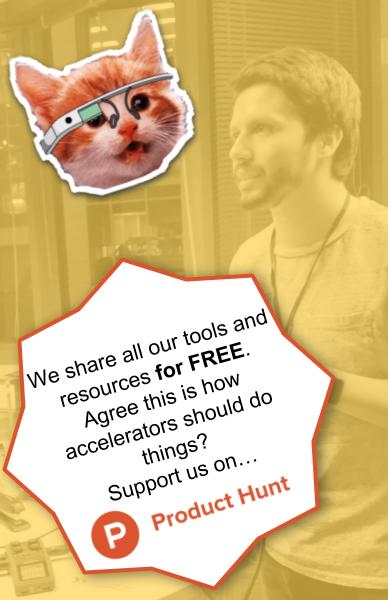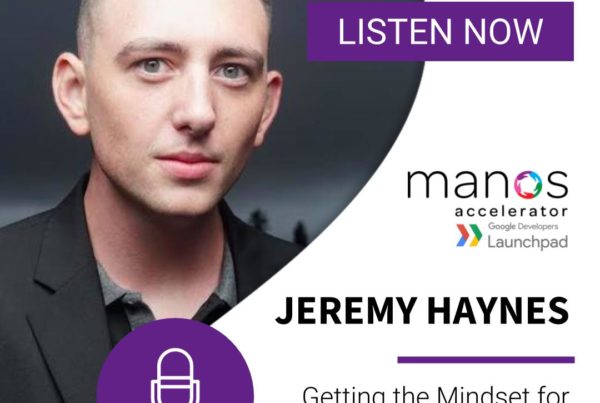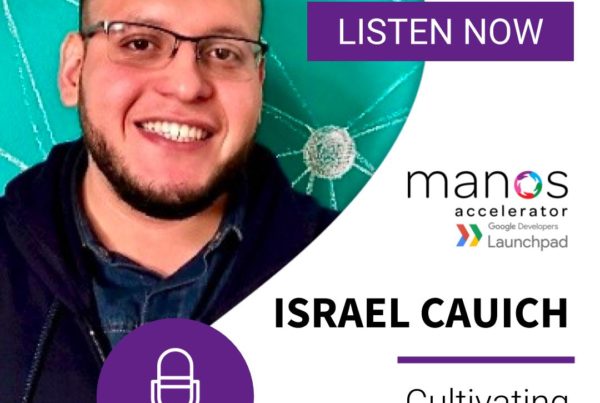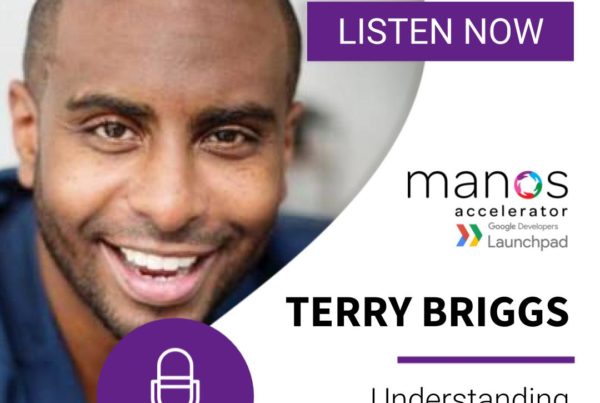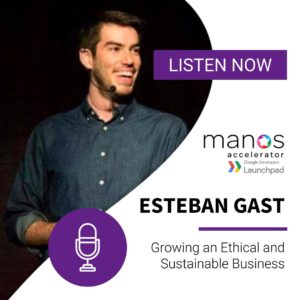 Esteban Gast is the COO and co-founder of Scriptd, a script database for writers. He’s a creator who empowers creators, an educator, entrepreneur, and entertainer.
Esteban Gast is the COO and co-founder of Scriptd, a script database for writers. He’s a creator who empowers creators, an educator, entrepreneur, and entertainer.
Esteban created a public access talk show, taught creativity at the college level, spoken at high schools, colleges, comedy clubs, and conferences. He’s also been featured on a TV show that aired on VICELAND and A&E. Currently, he is doing everything at Scriptd including building budgets, managing projects, building products, hiring, marketing, fundraising.
SUBSCRIBE
Show Notes
You are listening to the Manos Accelerator podcast in partnership with Google Launchpad. We interview rockstar entrepreneurs who share their exact formulas for success in customer acquisition, growth hacking, fundraising or scaling. And I’m your host, Juan Felipe Campos. Okay, Manos Nation! Remember for every episode there’s a giveaway of digital goods or resources from our partners that other people would normally pay for it. To enter the giveaway, subscribe to the podcast on iTunes now and then message the word “Manos” to m.me/ManosAccelerator. Again, that’s Manos to the website, m.me/ManosAccelerator. To prove it.
Juan: 00:34 Today we are interviewing Esteban Gast. And you are working on?
Esteban: 00:34 I’m working on Scriptd cofounder and CEO of Scripted.
Juan: 00:34 Tell us about Scriptd.
Esteban: 01:02 So Scriptd is a script database and app to help connect underrepresented writers in Hollywood to the industry. So we’re focused on telling really powerful stories and we’re doing that in a variety of ways. We’ve got a B2B side where we actually sell scripts and we’ve got a B2C side where we connect with the audience. Um, and we help them read really great scripts.
Sylvia: 01:22 Oh my God, Esteban that sounds amazing. Geez and Esteban, tell us where you’re from and tell us how you got started. Why did you come up with this idea?
Esteban: 01:26 Absolutely. So I am Colombian, Colombiano de Bogotá and I grew up in Puerto Rico and then Chicago, but going back to my whole family is in Columbia. Everything is there. Um, and one of the things, one of the reasons, I mean being Latino has completely shaped like everything.
Juan: 01:44 For sure.
Esteban: 01:45 I mean both personally but also professionally. So I went to, I went to Hollywood and I had those big, big dreams in Hollywood and I was actually on a TV show for a little. Please settle down.
Juan: 01:55 That is awesome.
Esteban: 01:56 Thank you so much. No, autographs.
Juan: 01:56 I’ll get your autograph after this.
Esteban: 02:00 Yeah, it was the lowest rated television show in history. It was a very poor, poorly rated TV show, but anywho. Right? So I, so I’m in, in LA and I just was noticing the lack of representation and I’ve seen this all my life. I’ve, I’ve always been aware about this. Um, but then you look into it and 88 percent of represented writers are white men. So this isn’t even, this isn’t women, this isn’t, you know, people of color. This is it. So it’s 88 percent of it.
Juan: 02:24 And it’s not just in like the adventure niche, it’s like they’re also writing comedy, like black comedies are writing like romantic comedies, targeted at women.
Esteban: 02:32 Like that’s how you get a characters that feel very, very, just like one dimensional. Right? So it’s like, oh, that is, yeah, this is a Latina like is that, I’ve never met her Latina that speaks like that. Like they’re saying. So there was this issue in and I felt very passionate about it and I started thinking about, okay, what are tools that we can give creators of color, um, to do that. Right? So I was also in meetings and pitching shows and they would say, I’m astounded, we love this TV show. Gosh, you know, you have some talented writing, but we don’t have that big of a Latin audience. And I was like, okay, well I think my show could, could reach beyond sort of like the LatinX community. I think it just is a show about friendship and love and family, right? So it’s something, okay, how can we break unconscious bias? Um, and then you also look at Hollywood and Hollywood.
Esteban: 03:17 The system hasn’t changed in 100 years. It’s all relationships, it’s all who, you know, it’s all backdoor deals and that’s how you got with the system that informal that, that perpetuates privilege. So that’s why it’s 88 percent white guys because it’s all who, you know, it’s all where you went to school. Uh, I was telling Juan before the interview started, for some reason in comedy, there’s a ton of guys from Harvard because Harvard has like, so you look at SNL, even SNL, 60 percent of the writers there went to Harvard, right? So all these different things and you’re like, these are the funniest people in the country, in the world right like? They will come from one school. I don’t know how that works out. So all of these things, right? This big problem. And then I linked up, um, there was this incredible entrepreneur named Denise.
Esteban: 04:04 She started Scriptd a few years ago, so her and I started throwing out ideas and how to take it to the next level and how to throw in, uh, these other, you know, these tools that helped create diversity inclusion but also generate revenue because we got to speak their language, we got to make money or you know, we’re in the diversity business because it’s good business, not just because it’s feel good.
Juan: 04:20 Right. Right.
Esteban: 04:22 So yeah, we started jamming about all these ideas and I was a producer somewhere else and creating these shows and I actually left that and I said, you know, what, like I can create singular change and create one show for Latinos, you know, as a producer or a writer or I can go and kind of step away from that and try to be an entrepreneur and try to create systemic change. So that happened a few months ago and it, it’s scary and it’s been a lot. And sometimes even yesterday I was with my lovely girlfriend and I was like, man, like when I was just a producer, things were easy. And now life is that. But it’s been incredible. The response has been, the response has been really great. And yeah, it’s, it’s, it’s the journey of entrepreneurship, right? Some days you go, we’re changing the world and some days you go, am I crazy? Am I understood? Crazy person.
Sylvia: 05:08 So Esteban, uh thank you so much for being here with us at the summit. I think this is amazing and so inspiring, uh inspiring, to see all these Latino entrepreneurs here with us here in San Francisco at the Google Launchpad. Um, so if you had to give a shout out or something that you want to say to our listeners in Latin America, lo más que hablan español o entienden español, que les puedes decir de tu companía?
Esteban: 05:25 Claro!
Sylvia: 05:25 Se lo puedes decir algo a ellos que los están escuchando de Latin América.
Esteban: 05:40 Yo creo que que lo que has ido lo más una tiene estar como you have this vision of what it, of what you need to get started. And I think, I don’t know, I went to public schools. I went to the University of Illinois because it was the cheapest one. Like it, I got to LA, I didn’t know anyone, uh, I just emailed, NALIP, National Association of Latino Independent Producers and was like, hey guys, I’m a Latino here. Like I knew no one. I still, I still don’t know too many people, like, and it’s nothing. We’ve gotten things optioned from our site, right? Our, our, our humble little site that’s growing and growing. But it’s like from the Milian family and Christina Milian, she had that show on E. She’s got a couple million followers, a Jay Ellis from HBO’s Insecure, one of the best shows on HBO, like all these people. Right. So, so I think you don’t have to have these crazy connections to get started. I think it’s like start before you’re ready.
Esteban: 06:28 Right. Sometimes I feel, I feel uh, yeah, sometimes I feel like I’m like, shoot, this is, this is nuts. What or who am I to do this? And, and I think that’s the whole beauty of it is start before you’re ready.
Juan: 06:39 Right. Right.
Esteban: 06:41 Yeah. You don’t need to know the people, you don’t need it. Like start and have this small thing. Right? So we’ve had this minimum viable product. We’ve had this small thing and we’ve slowly grown it and grown it and grown it and grown it and learned and learned and learned. Uh, and I think that’s how, like, that’s how it’s been able to be possible because we started this thing, we’re growing and we’re learning and we’re growing and we’re learning.
Juan: 06:59 That’s awesome. And to focus real quick on your, on your startup for a second, I, I really liked the way you explained it before when we were talking, it’s basically a double sided marketplace. You have script writers that upload their creations to your platform and then you have a market, whether that is people that want to read the scripts or people that actually want to purchase the rights to the script and then actually do something with it. Correct.
Esteban: 07:21 Yeah.
Juan: 07:22 And you’ve actually gotten some pretty good traction with it already, even though you’re at that early MVP stage. Can you speak to the traction you’ve?
Esteban: 07:28 Absolutely, yeah. So, so basically right now as we have screenwriters and they upload scripts and then we have two, two things happen. One is the general public reads scripts and here’s, it’s not just people are reading scripts and they’re buying scripts and they’re up voting scripts. Um, and then with that data we go to the industry itself and we say, Hey, you know, you’re looking for…
Juan: 07:50 So you actually operate as the agent on behalf of the more high performing scripts.
Esteban: 07:54 Totally. So we can, um, and then the entry point for the industry is very interesting because we do sort of operate as an agent or what we found is the industry will come to our site and they’ll call it Google for scripts. So they’ll come to our site and they’ll just look for things because we have really great tagging, right? We have really smart AI. So they’ll say, hey, I want a romantic comedy about, yeah, starring a sassy woman, you know, that sounds really great. Like someone wait, let’s get someone super sassy or I have an an actress, right? We’ll have actors and actresses come on the site. And I’m like, what do I want to play? And that actually happened with some of the talent that we have attached is they’ll, they’ll look up that. So they’ll be like, oh, I want to look up someone accomplished. Right. So, um, so yeah, so what’s really interesting was we have to, as B2C side where people are reading scripts were making money off of people buying scripts, um, people like the general public. And then we’re making money off the industry. I’m finding scripts and optioning them. And I think that’s another, if, if the advice to, to Latinos and Latinas who are maybe nervous, it’s, hey, start before you’re ready and get something small and build traction is that we’ve built this site and we, we think it’s one way and that the industry uses it a different way. The industry says, oh, this is great fit. It’s Google for scripts. Uh, we go, heck yeah, great. If you’re buying scripts, if you’re giving us money, if you know, because there’s a value exchange, of course it’s whatever you want it to be. We’ll lean into that. We’ll design it more that way. So.
Sylvia: 09:21 Okay, so Esteban. I have another question for you. How much money are you raising? How’s your fundraising experience going on? If there’s, if there’s an investor out there that wants to invest, how do they get ahold of you and how much are you raising? So give us a little bit information on that.
Esteban: 09:35 Absolutely. So we are, um, there’s, there’s different strategies. This is, this is our first time raising, um, so we have, there is a, a seed round that we’re looking at now and ideally we’d love like 18 months of runway, right? So then we could build out the app and build this, uh, and build out this app fully, kind of really address them with the industry, what the industry likes. So basically it’s 1 million or one point $2 million would take us to 18 months, but at the same time we also have this plan where we go, okay, well no matter what, if we get, you know, a seed round, at 250K, something like that, and we can really build that out. And then we’re starting to make money. We’re starting to make revenue. We’re already making revenue, but we would make significant revenue with 250K. So, so right now it’s sort of we’re at these entry points where these conversations where we say, okay, you know what, let’s get, let’s get 250K and then maybe let’s keep fundraising. Or we just stopped that at the seed and then we continue growing. Yeah. So, so it’s, we’re versatile in that, that, that hey, this 18 month runway, that’s that one, one point $2 million, but at the same time, you know, we’re in conversations now and people are writing smaller checks, 50K, 25K checks that we, that people have written and we’re like great. If we get to 250K we have this plan, we have this team, we have the tech team to get us to generate significant revenue.
Juan: 10:54 So you have like, you have pledges right now for kind of an angel round, but ideally you’re thinking I would rather just go ahead and raise a seed round and actually pulled me through the next 18 months instead of just the smaller checks that get me on the smaller.
Esteban: 11:06 Totally. That’s exactly right. Because because I want to run the business, you know, I don’t want to fundraise. And I think that’s, that’s the thing that we’re having there that since people are interested in, we’re sort of figuring out the seed run quickly. This angel round that’s 250. It’s like hey, let’s extend that and let’s see like let’s, yeah, let’s, let’s really give ourselves runway to do this.
Juan: 11:24 Get to a point where we can just focus on the business instead of fundraising in another three months.
Esteban: 11:31 Absolutely! I’m COO like I wanna I wanna O. I want to operate, I want to like, that’s what I want to do. Um totally and it’s so, so I think that’s the sort of tension that we’re finding and figuring out now. So the conversations with investors now are like, hey, this is, this is what we can do, but listen, we’re growing. This demographic is growing Hollywood in the last, at the end of 2017 fundamentally shifted with everything with Weinstein, you know like people want, it’s no, yeah, want diversity. We’re having these conversations. We’re at the forefront of this. We’re an inclusive marketplace for scripts where, you know, a place that respects all these individuals and they can come and you can truly find the best stories. So like, hop on because because yeah, because I think I think we’re going to be bigger than than uh, than we anticipated even before we were a little future. Right? So we’re a little ahead of a time and then Weinstein and everything happened and we’re like, holy smokes, like people, people want this.
Juan: 12:21 I see a lot of parallels. And for entrepreneurs that are listening to this that are maybe skeptical about the idea or maybe even investors that are skeptical about the idea, this is actually very. There’s a lot of parallels between what you’re building and what Quora was building initially. So what Quora ended up doing, and they even do it now, they are serving as agents for the writers that people in the community that are uploading their answers to the Quora platform and then there are people that work Quora is based out of Mountain View. They have a, I imagine either an internship team or a team of people that full time. What they do is they find the best answers in the community that are already written in a way that is an article for them, not just how do I turn off a light and then people and then someone answers. You turn off the switch or something like. It’s not for the really short answer. Since people that actually write an entire article forum with links and pictures and then they act as agents to those people that submitted the answers and submit them into Forbes Inc. Entrepreneur. So there is a Quora column inside of Forbes. there’s a Quora column instead of INK is a core of column instead of Entrepreneur, Business Insider, Fast Company, and they act as your agent on your behalf to find the best answers. And then just copy paste them. Best case scenario directly into Forbes. Now you as a writer have an incentive to keep wanting to put content on the platform because they’re acting as your agent. All you have to do is write, write amazing content all day, everyday. If you do that, they will get you to where you need to go in terms of more exposure, more trophies, traction, whatever that looks like for writers. And then what they’re getting out of it is the relationship with them. And in some cases they’re making money directly from Forbes that they need the content anyways. So it’s an entire ecosystem of basically what you guys are building.
Juan: 13:59 There are people that are buying scripts, there are people that are writing scripts that don’t know how to get eyeballs on it. If you act as an agent or you facilitate that relationship and you’re able to monetize on the agency side by getting people to purchase the scripts from your, uh, from your catalog, you are able to run a profitable business and you’re shaking up kind of the stagnant a way as you were telling us way that Hollywood has been for the last hundred years is so relational. And if anything, the industry itself is missing out on top notch talent because it’s just so hard to find and all you can do is turn to your buddy that looks and acts and has the same background as you do. And that just kind of creates a lot of, um, uh, oh whats the word that I’m looking for. But yeah, basically just like really stagnant. It doesn’t help push the industry forward, the storytelling forward a lot of the same stuff.
Esteban: 14:46 And we were like that. But we also amplify what agents or managers do right. So we’re not replacing. Because if you represent your writers and you go shoot, right? So even this scenario, no one, no one’s really catching onto these scripts. Let’s put it online. Let’s get some eyeballs on it, let’s get some traction, and then we take that data back to the industry. So we say, hey, here’s a script that, you know, my writer wrote uh here’s how many people read it. So that’s a built in audience, here’s where they are, here’s all this comprehensive data, here’s where they are, how old they are, we can guide to marketing, we can guide where they were, where the film opens, all these different things, right? So, so it’s huge. So everyone manages.
Juan: 15:25 It’s the Angel List, it’s the LinkedIn of that industry in a way as well because you already have all of the connections and all the data points for all of the content creators.
Esteban: 15:30 Totally! It’s not so, so we’re just combining all these things and seeing all these. Yeah, all these different revenue streams and all these entry points for the general public who wants to read scripts for the industry to find scripts and get this data on scripts and for agents and managers to sell their stuff for undiscovered writer who just arrives to Hollywood and goes, I don’t know what to do. Or actually not even Hollywood. You know, one of our last scripts is, is a woman in her forties, in North Carolina who wrote a brilliant script, right? So, and that’s the like for people who think that the best storytellers are one point of view, right? It’s, you know, usually this white guy lives in LA, like the best storytellers are, are people from different points of view.
Juan: 16:10 It should be that the best of the best, right? so the top period, not like the best of the best in LA or the best of the best that went to Harvard, that are funny, that are also living in California that da da da da. You’re robbing everyone from the best.
Esteban: 16:21 Totally! So here’s an incredible woman from North Carolina wrote this great script, it got optioned and she, and she’s a writer now, right? So she got a little bit of money, she’s a writer, she’s got traction, all these different things. So that’s how we’re moving the needle in terms of like writer representation is so small that these success stories genuinely move the needle. Right? So if there’s only a handful of, or there’s a few dozen writers of color of women writers. What we’re doing when we, when we empower this, when we connect them to the buyers, is we literally move the needle, which is nuts, which is less of how cool we are in more of how big of an issue is, and how hungry. That’s the thing like Wonder Woman made 700 million. Get Out, people were terrified Get Out wouldn’t make money. It’s a black guy, right? And he kills a white family. Oh my goodness. Everyone. Hollywood would not give them money. They gave them $4,000,000, which is nothing, nothing, nothing. And it made it $300,000,000. Right? So it’s like we are in this time where, where everything is shifting and Hollywood’s not catching up and we’re sort of saying, hey, yeah, the best stories from the best storytellers come from unexpected places. The stories that are unexpected. So let’s set up a system that, that just just recognizes that.
Juan: 17:31 While also reducing the risk for all of these studios because that’s what they like about doing like Batman 8 or like Fast and the Furious 19, it’s because they, it comes with a built in audience. It’s already kind of a safe investment on their end. So you’re already helping them say, guys, it’s, it’s a done deal. This got one point, 1 million views, you know, hopefully, you’ll be able to have these numbers a year from now or even six months from now and say, this script got this ridiculous traction has a built in audience. It’s proven, it’s viral, it’s one our platform. Here’s the price for it.
Esteban: 18:01 That is that is one hundred. Because if I gave your totally right and you’re doing such a like you’re, you’re talking about it in such a good way. Because if I only taught talk about the diversity piece, right? Studios would go interesting. Hmm seems kind of feel good. But if I go no, this, this helps you, this informs your green lighting decisions, this lowers your financial risk.
Juan: 18:20 You want to talk money? Let’s talk money. This isn’t a nonprofit like, oh, let’s just change the world.
Esteban: 18:22 Do you want data on every single person that’s read this script, how long they read it, where they are. Hey, do you want that? Do you like, because I have that. Oh, do you want something that million people read because you, you greenlight bestselling books and then you have to pay a writer to take a book to a script, write the script for you. A couple of million people read it done and I have all the data on it and they go, oh my goodness. And I go, hey, by the way it happens to be written by a Latina. Right? And they go, cool, we don’t care because we’re gonna make money. Right? So.
Juan: 18:50 Or if anything, oh cool. That’s like an even better point because we’re under a lot of fire under a lot of heat for the fact that we’re not doing enough on this space. So now we get to finally say like, okay, well this is what we’re doing to address that.
”We have to work with the people in power. We have to work with the smartest, we have to do that or else we're just hurting ourselves and it's like we're not going to lose our LA flare.
Esteban GastFounder of Scriptd
Esteban: 19:01 Totally. So they go, oh my gosh, yeah, we feel good about diversity, but really we feel really good about this script. That would do well, so we’d.
Juan: 19:07 That’s awesome. So just a couple more questions we’ve kind of gone over, but I’ll edit this and even this part out.
Esteban: 19:14 Of course.
Juan: 19:15 But just a couple of questions to get real. Gosh, where was I going with this? Talked a little bit about your idea of the train. Oh geez. Okay, that’s amazing. So tell me a little bit better.
Juan: 19:33 That’s amazing. so tell me a little bit about what you’re doing in Silicon valley. What the connection that you see, LA, you’re based in LA, there’s a lot of money there, there’s a lot of talent there. What brings you to Silicon Valley and what do you see as the potential between bridging those two ecosystems?
Esteban: 19:46 Totally. Well, I think the way that we succeed is we have to be a very collaborative, totally collaborative, like technically proficient. We need to tap into. We are SF LA, right? So, so we take sort of the Silicon Valley knowhow, how, what we’re doing with natural language processing here, what we’re doing with AI, what we’re doing in terms of the media technology that exists here and we’re bringing that down to LA, right? So, so we, for us to ignore the places that are creating some of the technologies that we can use, um, is, is just bad business.
Esteban: 20:22 So I think we’re, it’s more of an unofficial link, like, like, you know, we’re, we have an office in LA, we’re gonna hopefully soon as we expand, like open up an office in Mexico city like these different places, right? That are, that are sort of these hubs for entertainment. But at the same time I think it’s like the connection to SF totally collaborating with all these incredible groups, uh, learning about the latest technologies, seeing how we can use that to, to even do a better like organizing scripts in an even better way, right? Because there’s natural language processing or like all these different things. Uh, is, is totally here because we’re. Because we’re at the intersection of entrepreneurship and entertainment.
Juan: 20:55 I love it. And I think actually a lot of people don’t make the decision that you do. I could, I couldn’t agree more with what you’re doing, of connecting the dots, connecting all of these ecosystems, the bubbles. I think people tend to get really like offended or get a chip on their shoulder of like, I’m going to show the world that Miami or like the Tampa startup scene is going to take down Silicon Valley and I’m thinking, why are you a martyr for that cause? Why couldn’t you just say Tampa, what do we have tourism and the manatees and like all of these amazing things that are our unfair advantage that no one can replicate and if the best ecosystem to create the technology that’s gonna serve it isn’t Silicon Valley or the funding’s going to come from New York or the graphic design is going to come from that ecosystem.
Esteban: 21:35 You bring it there. And I think that’s something that we think about a lot is, is what are the existing power structures? And how can we. because we have to. Even though if we want to create this new structure, right? All these different things, these, we want to create a new marketplace and new structure, etcetera etcetera.
Juan: 21:48 You still want to stand on the shoulders of giants though, and not just flip everyone the bird and say like, no, I’m going to show you that I can do it. Like, you know.
Esteban: 21:56 Totally, and it’s like, okay, well we have to. Yeah, we have to work with the people in power. We have to work with the smartest, we have to do that or else or else we’re just hurting ourselves and it’s like we’re not going to lose our LA flare. We’re not going to lose the fact that we work with celebrities and that’s interesting. We’re not going to fact that we we’re passionate about screenwriting and really good story. We’re not going to lose the fact that like, you know we’re going to be the only startup at, at, you know, film events and we were doing something at Sundance and all these things like we’re not going to lose our identity when we go and connect with these other ecosystems.
Juan: 22:26 Right, right. I so appreciate you sharing that point. I just want to give a bit of advice to my LA entrepreneurs. Those of you that are in LA, what LA has going for it is that LA understands attention. It understands customer acquisition. It understands where people’s eyeballs actually are. That’s on Facebook. It’s on Instagram, Snapchat, wherever those social media platforms are, that’s where we’re spending 80 percent of our time on our cell phones. LA gets that it understands that. That is the differential. I don’t have to build a yoga, a pair of yoga pants or have a diet or come up with a kind of coffee that’s 10 times better than the alternative. I can just come up with literally the same thing as every, as JC Penney, the same pair of yoga pants. It’s just that I’m an influencer and I understand that people are, sooner or later going to find out about my product through here. I don’t. I don’t even need the differential outside of the brand. LA gets that. Silicon Valley is still stuck in some ways, both for good and bad on building what’s going to be in the future 10 years from now and having that be the differential and the reason that people use your product is because it’s so advanced. I think that those LA entrepreneurs that understand that there’s a positive in both of those ecosystems and that you shouldn’t hate the difference. It just is a difference and if you can leverage both of those strengths, the tech background of Silicon Valley making something that is 10 times 10 years into the future with the analytics, with the tracking with the NLP, what the ML with all of it with the AI and understand that at the end of the day you have to be getting the customer acquisition through nontraditional channels that LA is dominating at right now. Those are the people that are gonna win.
Esteban: 23:53 Totally. And I think that the thing that you can think about your city is, yeah, what is your city doing really well? Rights are, or what are the things. So if LA is. Yeah, 10 years I was in Chicago for a little. Uh, yeah, and the Chicago, Chicago entrepreneurship entrepreneurship scene, uh, has, has all these unique things about it that’s like, okay, well great. Well, like Groupon was built in Chicago and Chicago startup, right? And it’s like, and it thrives on these things. It’s like gritty, it’s more grounded. It’s like right Groupon, By no coincidence is coupons and serves a totally different. It’s not like SF being like, hey, we’re going to build something you know like the future. And in the early adopters are these futurists. Groupon is like, hey man, here’s your mom wants to save money.
Esteban: 24:36 You want to save money. Yeah, that’s the Chicago way.
Juan: 24:37 It’s like really practical.
Esteban: 24:39 Yeah, totally. It’s like that’s what we’re gonna do. We’re the midwest, we love coupons, right? So it’s like every city. Yeah, the person who
Juan: 24:47 And yeah it’s not technically advanced it’s just, it’s just 10 to 50 percent off stuff. Yeah, the tech itself isn’t anything special.
Esteban: 24:54 But the are a billion dollar, like they’re fine. So it’s all these things. Totally. And it’s like, okay, well what is unique to your city? And if your startup can capitalize on that, right? So, so if you’re like, we are building an LA based startup, like they, it has to be in LA, there’s no way we can write in New York because New York isn’t, isn’t doing the things that are like, we are like
Juan: 25:14 In New York you have to be in banking or wall street or Fashion or foodies. It’s going to be totally different.
Esteban: 25:19 Totally even their entertainment’s a little right? It’s more theater. It’s all yeah, and then in LA I walked back. Some of my best friends are lit like literal Youtube and Snapchat stars that have 10 million followers on Snapchat. That’s the, those are the people I hang out with in LA who were amazing. And then. Yeah so then when the time comes you’re like, hey, can you talk to me about how you gain 10? Like in, in 15 second clips, how do you do that? Because that’s going to be the best marketing and that’s going to be a conversation that you can’t have anywhere else in the country.
Juan: 25:49 Super, super valuable Esteban, Scripted, I wish you guys all the best
Esteban: 25:50 Thanks so much.
Juan: 25:51 All the listeners, this was gold, gold, gold content. I hope you listened to this podcast three times over. Thank you so much for joining us. Here at the Google Launchpad.
Esteban: 26:00 And thank you for it. Like the something else. I think a lot of times I get, I get nervous and daunted about being a Latino entrepreneur and not having the connections and all these different things and I think finding Manos and, and a lot of the Latino community, the LatinX community, but specifically Manos, and what you guys have done. I mean it’s, it is. It’s like it truly is a game changer in the way that I go. Oh my gosh, there is support. There’s people I can email uh I don’t feel crazy. There’s people like me. Right? So even this conference, just like meeting people and I’m like, oh my gosh, we’re in the same boats. Uh, all these different things. So. So what you’re. Thank you for creating a space for people to feel not crazy as Latins and be like, you know what? We’re going to be okay. We’re going to keep fighting the fight. Yes. I appreciate it.
Juan: 26:43 Thanks for being on the podcast.
Esteban: 26:44 Thank you man.
Juan: 26:49 Okay, Manos Nation! Do not forget your chance to win digital goods and resources on every episode right here on the podcast. It’s very simple. You just subscribe to the show on iTunes. Once you’ve done that, message the word “Manos” to m.me/ManosAccelerator. Subscribe on iTunes and then message Manos to the website, m.me/ManosAccelerator. See you on the next one.
Social Media:
- LinkedIn: https://www.linkedin.com/in/esteban-gast-59847a24/
- Website: https://www.estebangast.com/

